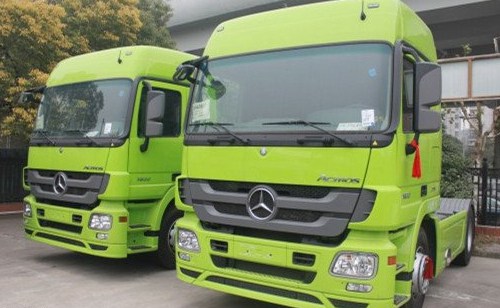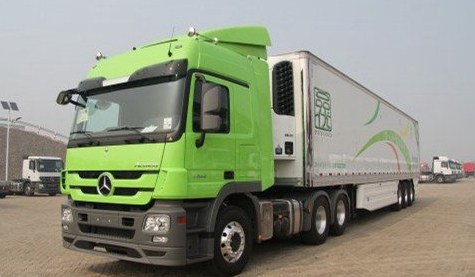At the Shanghai Auto Show in April last year, Daimler officially announced the establishment of Daimlerka Bus (China) Co., Ltd. (hereinafter referred to as Daimlerka Bus), responsible for the operation of Mercedes-Benz trucks in China. After the new company was established, China’s import heavy truck market has experienced roller coaster-like fluctuations. The market scale has declined from 15,000 units in 2012 to more than 7,000 units in 2013, a year-on-year decline of more than 50% due to the domestic construction industry. The decrease in engineering volume has led to a significant decline in demand for vehicles.
We have realized that we cannot walk on this leg (building construction vehicle). At a Mercedes-Benz truck brand event held in Tianjin recently, Robert Frederick Veit, President and CEO of Daimlerka Bus China, told the reporter frankly, “We want to diversify. One of Robert's "diversified development" routes is to force the sudden emergence of domestic logistics industry car market. In order to adapt to this market change, in March of this year, Daimlerka Bus made a fresh adjustment to its internal organizational structure and split the marketing department into retail and wholesale departments to meet the individualized demand of logistics customers.

Mercedes-Benz truck business dragged down the market environment <br> <br> According to Robert introduction, Mercedes-Benz trucks in 2013 total sales of 3271, the market share of imports in the year of heavy trucks are still more than 40%, however, compared with the same period in 2012. 6151 sales A sharp decline has occurred. In this regard, Robert believes that the ups and downs of the imported heavy truck market have a direct bearing on the prosperity of the construction machinery industry. “The construction machinery industry experienced a significant increase last year, and the sales of Mercedes-Benz trucks also followed a significant decline because most of our sales were concentrated on the chassis of pump trucks,†Robert told reporters.
In 2011 and 2012, due to the stimulation of relevant investment policies of the country, many heavy machinery companies increased their purchases, and the domestic high-end imported truck market showed rapid growth. In 2013, along with the emergency brakes of related infrastructure investment and construction projects, truck manufacturers in the domestic heavy industry machinery industry and industrial chain all appeared to be somewhat off guard. Prior to this, our customers were encouraged by local governments to increase production capacity. However, in 2013, due to the sluggishness of the industry, our largest three customers, Zoomlion Heavy Industries, Sany Heavy Industry, and XCMG were all greatly affected. “Zhang Wubin, director of wholesale business of Daimlerka Bus, explained.
In 2012, domestic sales of imported heavy trucks reached 15,000 units; in 2013, the imported heavy truck market experienced a “backlash†and only 7,100 vehicles were sold in the year. In 2013, the sales volume of the heavy truck market in China was approximately 774,000 vehicles, a substantial increase of 22% year-on-year, but the share of imported heavy trucks was less than 1%. In this regard, Robert believes that 2012 is an “abnormal growth†state, and this high-speed growth situation will “difficult to happen againâ€. The import heavy truck market will enter into a gentle growth from this year, and the increase will not be significant. The imported heavy truck will remain a niche market for a long time. Roberts believes that the market share of imported heavy trucks will remain at around 2%.
The main attack logistics market segment 
This year, Mercedes-Benz truck sales growth will mainly come from the market demand for logistics. Robert said, “The sales target of Mercedes-Benz trucks in China in 2014 is basically the same as in 2013. This goal does not seem to be difficult, but it is not true. We have to increase the use of cars in the non-construction industry. In the past, Mercedes-Benz truck business The focus is mainly on the mixer truck and pump truck chassis market, while Volvo trucks are mostly concentrated in the field of fast logistics, while MAN brand heavy trucks occupy the market advantage in the field of fire engines. It can be said that several major imported brands have their own advantage market segments.
In 2013, our market share in the imported concrete pump truck chassis market was 44%, the oilfield vehicle chassis occupancy rate was 67%, the fire truck chassis occupancy rate was 35%, and the tractors had only 26% share. According to Robert, this also means that the traction car in the logistics field will be the main market for Mercedes-Benz trucks.
In light of the high load and high value of the high-end logistics industry, Mercedes-Benz Trucks has launched the new Axor 1840. According to reports, this is a brand-new product created specifically for China Express and E-Commerce Logistics. It not only uses lightweight bodywork, an efficient power system, an oversized fuel tank, and a comfortable dual-sleeper cab, but also comes standard with the FleetBoard Remote Vehicle Management System. "We plan to increase sales in the logistics sector by 80%. This growth target is very challenging," said Robert. In 2013, of the 3,271 heavy trucks Mercedes-Benz sold in China, about 1,000 were from non-construction vehicles.
According to him, in order to achieve this growth target, Mercedes-Benz trucks have implemented organizational restructuring in the company, and the original sales division has been split into the retail business department and the wholesale business department. The two departments have independent management teams and marketing teams. , The retail business department is mainly responsible for docking with distributors of Mercedes-Benz trucks to promote the continuous increase in sales of dealers; the wholesale business department will focus on opening up large customers.
Mercedes-Benz's sales volume in the logistics vehicle market in 2013 was 75% higher than that in 2012. We expect this year to also be a steady increase. Zhang Rui, director of retail business of Daimlerka Bus, told the reporter, “From the perspective of the country’s macroeconomic regulation, a large amount of investment is slowly shifting from infrastructure to the tertiary industry, accompanied by the vigorous development of e-commerce, especially the third line. Changes in consumer behavior in the fourth-tier cities will have more market space for e-commerce logistics.
At present, imported brands such as Volvo, Scania, and Man also launch a series of product and service solutions for the Chinese market. In the heavy truck market, the slower growth rate may trigger a new round of fierce competition.